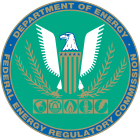
FEDERAL ENERGY REGULATORY COMMISSION (FERC)
 |
|
| overview | |
| Formed | October 1, 1977 |
| Preceding | Federal Power Commission |
| Jurisdiction | U.S. Government |
| Headquarters | Washington, D.C |
| executive | Jon Wellinghoff, Chairman |
| Parent | Department of Energy |
| Website | http://www.ferc.gov |
The Federal Energy Regulatory Commission (FERC) is the United States federal agency with jurisdiction over interstate electricity sales, wholesale electric rates, hydroelectric licensing, natural gas pricing, and oil pipeline rates. FERC also reviews and authorizes liquefied natural gas (LNG) terminals, interstate natural gas pipelines and non-federal hydropower projects.
Contents
Background
A predecessor agency, the Federal Power Commission, was founded in 1930 to allow cabinet members to coordinate federal hydropower development.
In 1935, the FPC was transformed into an independent regulatory agency with five members nominated by the President and confirmed by the Senate. At that time the FPC regulated both hydropower and interstate electricity.
In 1938, the Natural Gas Act gave FPC jurisdiction over interstate natural gas pipelines and wholesale sales. In 1942, this jurisdiction was expanded to cover the licensing of more natural gas facilities. In 1954, the Supreme Court decision in Phillips Petroleum Co. v. Wisconsin extended FPC jurisdicition over all wellhead sales of natural gas in interstate commerce.
In response to an energy crisis, Congress passed the DOE Organization Act in 1977, which consolidated various energy-related agencies into a Department of Energy. Congress insisted that a separate independent regulatory body be retained, and the FPC was renamed the Federal Energy Regulatory Commission, preserving its independent status "within" the Department.[1] FERC was also given added responsibility to hear appeals of DOE oil price control determinations and to conduct all "on the record" hearings for DOE.[2] As a result, DOE does not have any administrative law judges. As a further protection, when DOE proposes a rulemaking, it must refer the proposal to FERC, and FERC can take over the proceeding if FERC determines that the rulemaking "may significantly affect" matters in its jurisdiction.[3] The DOE Act also transferred the regulation of interstate oil pipelines from the Interstate Commerce Commission to FERC.[4] However, the FERC lost some jurisdiction over the imports and exports of gas and electricity
In 1978, FERC was given additional responsibilities for harmonizing the regulation of wellhead gas sales in both the intrastate and interstate markets. FERC also administered a program to foster new cogeneration and small power production under the Public Utilities Regulatory Policy Act of 1978.
In 1978, FERC was given additional responsibilities for harmonizing the regulation of wellhead gas sales in both the intrastate and interstate markets. FERC also administered a program to foster new cogeneration and small power production under the Public Utilities Regulatory Policy Act of 1978.
The Energy Policy Act of 2005 expanded FERC's authority to impose mandatory reliability standards on the bulk transmission system and to impose penalties on entities that manipulate the electricity and natural gas markets. The Energy Policy Act of 2005 gave FERC additional responsibilities as outlined in FERC's Top Priorities and updated Strategic Plan. As part of that responsibility, FERC:
- Regulates the transmission and sale of natural gas for resale in interstate commerce
- Regulates the transmission of oil by pipelines in interstate commerce;
- Regulates the transmission and wholesale sales of electricity in interstate commerce;
- Licenses and inspects private, municipal, and state hydroelectric projects;
- Approves the siting of and abandonment of interstate natural gas facilities, including pipelines, storage and liquefied natural gas
- Ensures the reliability of high voltage interstate transmission system
- Monitors and investigates energy markets
- Uses civil penalties and other means against energy organizations and individuals who violate FERC rules in the energy markets
- Oversees environmental matters related to natural gas and hydroelectricity projects and major electricity policy initiatives; and major electricity policy initiatives
- Administers accounting and financial reporting regulations and conduct of regulated companies.
Position within the government
FERC is an independent regulatory agency within the United States Department of Energy. Neither the President nor Congress reviews FERC decisions. All FERC decisions are reviewable by the federal courts. FERC is also self-funding. The Commission pays for itself by recovering costs directly from the industries it regulates through annual charges and fees.
FERC is independent of the Department of Energy, but DOE may intervene just like any other party in FERC proceedings. FERC activities "shall not be subject to further view by the Secretary [of Energy] or any officer or employee of the Department."[5]
In recent years, the FERC has been promoting the voluntary formation of Regional Transmission Organizations (RTOs) and Independent System Operators (ISOs) to eliminate the potential for undue discrimination in access to the electric grid. However since the passage of new energy legislation, it has aggressively developed regulations to implement key provisions of the new law dealing with LNG terminals, electric reliability, Public Utility Holding Company Act of 1935 repeal and implementation of the Public Utility Holding Company Act of 2005, new merger regulations and new anti-market manipulation regulations.
FERC has also been heavily involved in the California electricity crisis and in investigating allegations of electricity market manipulation by Enron and other energy companies. FERC has collected over $6.3 billion from California electric market participants by facilitating settlements. FERC is also working with Canadian energy officials to facilitate processing of a proposed Alaskan Natural Gas Pipeline, which would bring natural gas from Alaska's North Slope to the lower 48 States.
FERC regulates approximately 1,600 hydroelectric projects in the U.S. It is largely responsible for permitting the construction of a large network of interstate natural gas pipelines. FERC also works closely with the United States Coast Guard in reviewing the safety, security and environmental impacts of proposed LNG terminals and associated shipping.